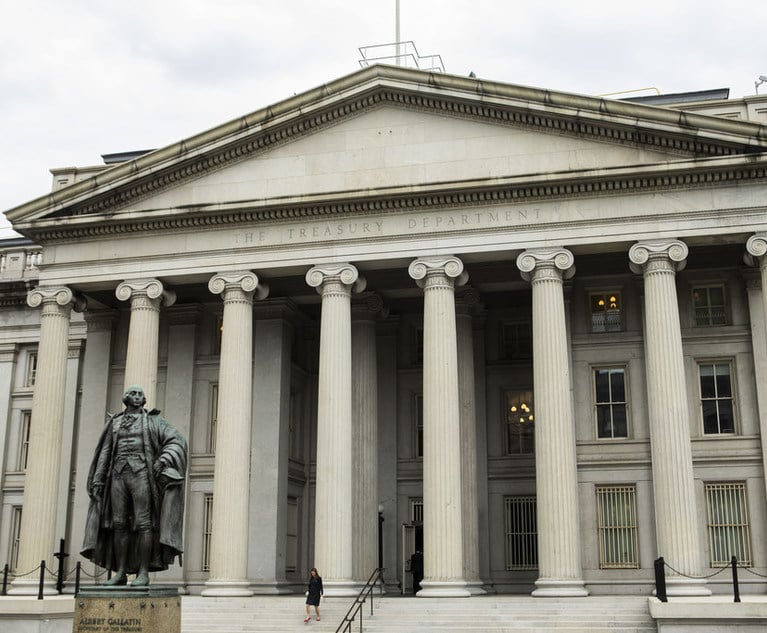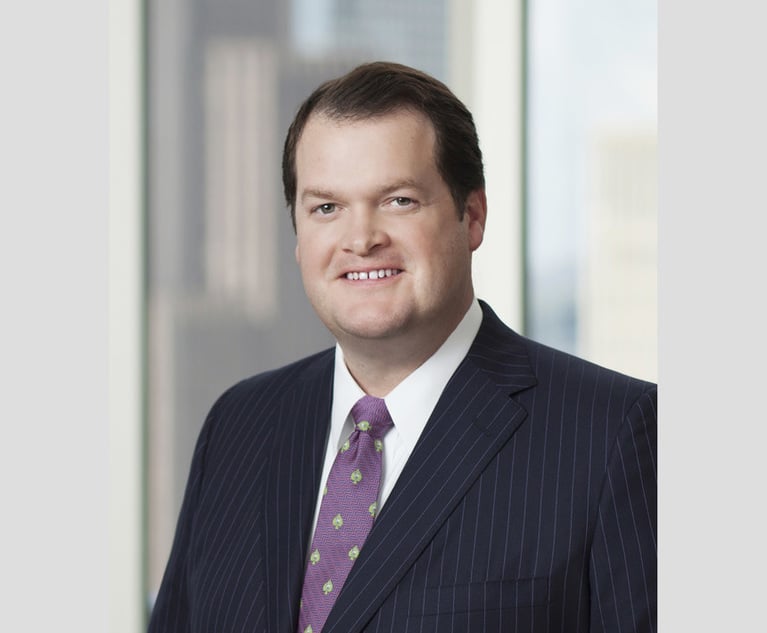Recruiter's Suit Sheds Light on Fierce Lateral Market in Texas
A dispute involving a legal recruiter and another recruiting firm provides a glimpse of the behind-the-scenes moves of several national law firms that have swooped into the Lone Star State to launch and expand local offices.
August 23, 2018 at 12:13 PM
7 minute read
 Photo: Shutterstock
Photo: Shutterstock
A recruiter's suit in Texas that refers to lateral deals of several prominent law firms has been quietly litigated this year and reached a settlement within the last month.
The case, filed by one recruiter against another recruiting firm, offers a glimpse of the behind-the-scenes moves of several national law firms that have swooped into the fierce Lone Star State lateral market to open or expand offices in Texas. The suit is also an indication of the highly lucrative deals between law firms, attorneys who change firms and the agents who help move them.
The litigation by recruiter Carrie Trabue of Carrington Legal Search against Clint Johnson of Johnson Downie in Harris County, Texas, name-drops potential lateral deals involving Orrick, Herrington & Sutcliffe, McDermott Will & Emery, Winston & Strawn and others. Throughout her complaint, Trabue describes several instances in which Johnson allegedly sabotaged her fees and business after she said the duo had formed a partnership to work together.
Trabue filed her suit, which has not yet previously been reported on, in January 2018. She alleges that she and Johnson Downie formed a partnership in November 2014 when Trabue was working to place a group of lawyers interested in leaving K&L Gates. Trabue contacted Johnson Downie to partner with the agency for the move, and they agreed to a 50-50 split of fees earned from placing the group, according to her suit.
The group was interested in Orrick, which itself was keen on opening an outpost in Texas. Instead of promoting the K&L Gates group, however, the suit claims that Johnson advanced his own interests “by convincing Orrick to open its first Texas office in Houston”—Johnson's home market—rather than in Dallas.
“Johnson Downie ultimately made millions of dollars in connection with the opening of Orrick's Houston office, but cut [Carrington Legal] out of this deal and the resulting fees,” Trabue's suit stated.
On Jan. 19, 2016, Orrick announced the opening of a Houston office after making 15 lateral additions from six firms: Andrews Kurth, DLA Piper, Haynes and Boone, McDermott, McGuireWoods and Susman Godfrey.
Nonetheless, Trabue's suit alleges that the K&L Gates group—referred to in her complaint as “Group A”—was placed in June 2015 at McDermott. That same month, McDermott unveiled its addition of six partners, all formerly affiliated with K&L Gates' Dallas office, who focused their practice on M&A, technology and outsourcing work.
Trabue's suit claims that McDermott had a fee agreement with Johnson Downie capping fees at $750,000. Trabue said Carrington Legal agreed to Johnson Downie's request of a “small discount” from the cap to facilitate the placement. Johnson Downie paid $300,000 to Carrington Legal, half of the $600,000 purportedly paid to Johnson Downie from McDermott for the placement. But Carrington Legal learned that Johnson Downie was actually paid the full $750,000 and “simply pocketed the difference,” according to Trabue's complaint.
Her suit also accuses Johnson Downie—an outfit known for its expertise in helping Am Law 100 firms enter the Texas legal market—of breaching client confidentiality, costing its partnership with Carrington Legal a major placement and falsely accusing Trabue's recruiting firm in order to cover its own tracks.
For instance, Trabue's suit asserts that Johnson Downie contacted Winston & Strawn about a group moving from Andrews Kurth, now called Hunton Andrews Kurth following a merger earlier this year. Winston & Strawn allegedly expressed interest in opening a Dallas office with the group, according to her complaint. In October and December 2015, meetings were set up between Winston & Strawn and the recruitment candidates.
But the suit states that Johnson told a lawyer at another firm about a potential lateral move to Winston & Strawn and that individual approached another lawyer in the Andrews Kurth group—referred to as “Lawyer J” in the case—about the move.
“When Lawyer J called Johnson to complain, Johnson deflected blame by falsely accusing Trabue of the breach of confidentiality,” states her suit.
The breach of confidence, amid other actions, led the Andrews Kurth group not to proceed with the moves, resulting in a loss of fees to Carrington Legal and the loss of the relationship with the group, she said in her complaint.
“This also delayed the opening of Winston's Dallas office,” according to her suit, which noted that the firm ”was unwilling to open a Dallas office without a corporate group.”
Ultimately, Winston & Strawn set up shop in Dallas office in January 2017 after bringing on more than 20 partners from eight different firms.
Trabue's suit also describes the recruiters' fee sharing arrangements, including an August 2015 arrangement in which Carrington Legal would receive half of the fees for Dallas placement candidates and 35 percent of fees for Houston candidates, as well as an October 2015 agreement in which Carrington Legal's fees for Dallas were reduced to 35 percent.
In a March 2016 meeting, the suit said, Johnson attempted to renegotiate the contract by proposing that Trabue become an employee of Johnson Downie. Trabue said she declined and decided to stop working with Johnson Downie, but she made clear that she expected to be paid under the terms of their previous fee agreements.
Still, after April 2016, Johnson Downie placed several candidates without paying the 35 percent share due to Carrington Legal, according to her suit.
Trabue's case against Johnson Downie includes several claims, including breach of contract and fraud related to the McDermott lateral hires and breach of fiduciary duty and tortious interference related to the group placed at Orrick.
'Very Limited' Agreements
Responding in court papers, Johnson and his recruiting firm denied that they entered into a partnership with Trabue and Carrington Legal and that they never agreed to share the profits from a joint business.
In counterclaims, the defendants said the parties “entered into very limited, informal agreements” about certain candidates. Johnson Downie claimed that in April 2016, the parties entered into a “tail agreement” after Trabue decided to no longer continue a relationship with Johnson Downie.
Johnson Downie's counterclaims asked the court to issue a declaratory judgment that the April closing agreement superseded and terminated all previous agreements between them. Johnson Downie also asked for attorney fees and to assess costs against Trabue.
In late July, a mediator, Houston-based Nancy Huston, told the judge hearing the case, Kyle Carter, that the “entire lawsuit has been resolved” and that the parties were in the process of drafting final documents. On Aug. 10 the parties jointly moved to dismiss their claims against each other, with prejudice. An Aug. 14 order by the judge dismissed the case.
Trabue and Carrington Legal's lawyer, Randall Sorrels, a partner with Abraham, Watkins, Nichols, Sorrels, Agosto & Aziz in Houston, said he could not discuss terms of the settlement because of a confidentiality agreement.
In an email message, Johnson and Johnson Downie's lawyer, Wilson Elser Moskowitz Edelman & Dicker partner Linda Wills in Houston, co-chair of the firm's labor and employment practice, said “the resolution of the claim and the responsive counterclaims is confidential.”
Trabue did not immediately return a telephone message left at Carrington Legal, nor did Johnson at Johnson Downie.
Media contacts for McDermott also didn't return requests seeking comment, while spokeswomen for Winston & Strawn and Orrick declined to comment.
Brenda Sapino Jeffreys in Texas contributed to this report.
This content has been archived. It is available through our partners, LexisNexis® and Bloomberg Law.
To view this content, please continue to their sites.
Not a Lexis Subscriber?
Subscribe Now
Not a Bloomberg Law Subscriber?
Subscribe Now
NOT FOR REPRINT
© 2025 ALM Global, LLC, All Rights Reserved. Request academic re-use from www.copyright.com. All other uses, submit a request to [email protected]. For more information visit Asset & Logo Licensing.
You Might Like
View All
Supreme Court Reinstates Corporate Disclosure Law Pending Challenge



Supreme Court Considers Reviving Lawsuit Over Fatal Traffic Stop Shooting
Trending Stories
- 1Pogo Stick Maker Wants Financing Company to Pay $20M After Bailing Out Client
- 2Goldman Sachs Secures Dismissal of Celebrity Manager's Lawsuit Over Failed Deal
- 3Trump Moves to Withdraw Applications to Halt Now-Completed Sentencing
- 4Trump's RTO Mandate May Have Some Gov't Lawyers Polishing Their Resumes
- 5A Judge Is Raising Questions About Docket Rotation
Who Got The Work
J. Brugh Lower of Gibbons has entered an appearance for industrial equipment supplier Devco Corporation in a pending trademark infringement lawsuit. The suit, accusing the defendant of selling knock-off Graco products, was filed Dec. 18 in New Jersey District Court by Rivkin Radler on behalf of Graco Inc. and Graco Minnesota. The case, assigned to U.S. District Judge Zahid N. Quraishi, is 3:24-cv-11294, Graco Inc. et al v. Devco Corporation.
Who Got The Work
Rebecca Maller-Stein and Kent A. Yalowitz of Arnold & Porter Kaye Scholer have entered their appearances for Hanaco Venture Capital and its executives, Lior Prosor and David Frankel, in a pending securities lawsuit. The action, filed on Dec. 24 in New York Southern District Court by Zell, Aron & Co. on behalf of Goldeneye Advisors, accuses the defendants of negligently and fraudulently managing the plaintiff's $1 million investment. The case, assigned to U.S. District Judge Vernon S. Broderick, is 1:24-cv-09918, Goldeneye Advisors, LLC v. Hanaco Venture Capital, Ltd. et al.
Who Got The Work
Attorneys from A&O Shearman has stepped in as defense counsel for Toronto-Dominion Bank and other defendants in a pending securities class action. The suit, filed Dec. 11 in New York Southern District Court by Bleichmar Fonti & Auld, accuses the defendants of concealing the bank's 'pervasive' deficiencies in regards to its compliance with the Bank Secrecy Act and the quality of its anti-money laundering controls. The case, assigned to U.S. District Judge Arun Subramanian, is 1:24-cv-09445, Gonzalez v. The Toronto-Dominion Bank et al.
Who Got The Work
Crown Castle International, a Pennsylvania company providing shared communications infrastructure, has turned to Luke D. Wolf of Gordon Rees Scully Mansukhani to fend off a pending breach-of-contract lawsuit. The court action, filed Nov. 25 in Michigan Eastern District Court by Hooper Hathaway PC on behalf of The Town Residences LLC, accuses Crown Castle of failing to transfer approximately $30,000 in utility payments from T-Mobile in breach of a roof-top lease and assignment agreement. The case, assigned to U.S. District Judge Susan K. Declercq, is 2:24-cv-13131, The Town Residences LLC v. T-Mobile US, Inc. et al.
Who Got The Work
Wilfred P. Coronato and Daniel M. Schwartz of McCarter & English have stepped in as defense counsel to Electrolux Home Products Inc. in a pending product liability lawsuit. The court action, filed Nov. 26 in New York Eastern District Court by Poulos Lopiccolo PC and Nagel Rice LLP on behalf of David Stern, alleges that the defendant's refrigerators’ drawers and shelving repeatedly break and fall apart within months after purchase. The case, assigned to U.S. District Judge Joan M. Azrack, is 2:24-cv-08204, Stern v. Electrolux Home Products, Inc.
Featured Firms
Law Offices of Gary Martin Hays & Associates, P.C.
(470) 294-1674
Law Offices of Mark E. Salomone
(857) 444-6468
Smith & Hassler
(713) 739-1250






